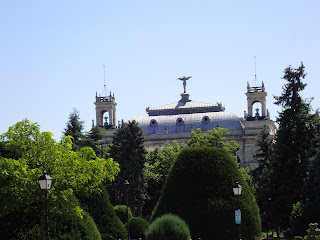This will be my last entry
for this holiday as I am flying back to the UK later today. I have been staying in the Hotel Marmorosch
while in Bucharest; the hotel is a converted bank.
Thursday, July 3, 2025
3rd of July 2025 - Snagov Palace and Vlad the Impaler
Snagov Palace, again very opulent,
is a historic royal residence which has been built on the shores of Lake Snagov,
northeast of Bucharest. We drove up to
the palace through an extensive wooded estate frequented by a number of wild
animals, none were to be seen. Snagov
Palace was built by Prince Nicolae, brother of King Carol II, between 1930–1932.
Nicolae Ceaușescu extensively
renovated the palace in the 1980s even adding a gym and swimming pool. On the 22nd of December 1989 Ceaușescu
briefly fled to Snagov Palace by helicopter from Bucharest during the Romanian
Revolution before being captured.
We had to wear blue plastic covers for our shoes to protect the beautiful wool rugs in Snagov Palace.
The final resting place of Vlad the Impaler, also known
as Vlad III or Vlad Dracula, is shrouded in mystery and debate. “Dracula” means “son of Dracul”, a title Vlad
inherited from his father who was a member of the Christian knightly order "the
Order of the Dragon". The link
between Vlad the Impaler and Count Dracula is a fascinating blend of historical
fact and gothic fiction including Bram Stoker’s 1897 novel Dracula. Stoker never explicitly stated that Vlad was
the model for Count Dracula however the name, the Transylvania region and dark
legacy suggest a strong influence. We
visited Snagov Monastery, situated on an island in Lake Snagov, which has long been
believed to be Vlad’s burial site due to local legends and historical ties. Excavations in the 1930s revealed no human
remains in the tomb, only animal bones. One
alternative theory is that Vlad's burial site is at Comana Monastery situated
near the battlefield where Vlad was reportedly killed in 1476. Despite the intrigue, no theory has been
definitively proven.
In the evening some of us went on a Romanian foodie tour with a local guide to taste authentic Romanian flavours. Each of
our three courses were held in a different restaurant. The most amazing course was the traditional
Romanian dessert Papanasi which is made from cow's cheese, eggs, sodium bicarbonate
and flour. Papanasi
is similar to a fried doughnut topped with a doughnut ball and served with sour
cream and berry jam. This dessert was delicious but so
large that I gave up halfway through.
2nd of July 2025 - Bucharest
Today we disembarked our ship in Giurgiu and drove
through the countryside to Bucharest.
Bucharest began as a fortress in the 15th century and saw glory days as
the summer residence of the Wallachian princes.
The city was burned to the ground by the Ottoman Turks then
Austria-Hungary and imperial Russia fought over it for a century. Wallachia and
Moldavia united to form Romania in the mid-19th century; after this Bucharest
enjoyed a prosperity that was reflected in its extravagant architecture, some
of which manage to survive World War II bombing and communist building
programs.
On reaching Bucharest our first visit was to the colossal
Palace of Parliament which is one of the largest office buildings in the
world. This building was too large for me to be able to take a picture of the entire building so I took a picture of a model of the building.
The Palace of Parliament was
ordered by Nicolae Ceaușescu, the last communist leader of Romania, but was not
completed until eight years after his death.
The Palace now houses the Romanian Parliament and three museums. We visited the Senate area of the Palace of
Parliament, which was opulent to say the least, filled with crystal
chandeliers, mosaics, marble, gold leaf, and stained-glass windows.
A new cathedral is being built close to the Palace of Parliament.
We were given a coach tour of Bucharest city before arriving at our hotel in the old town of Bucharest. This included Bucharest’s very own Triumphal Arch, modelled after the Arc de Triomphe in Paris, and sites where protests brought down Ceaușescu’s regime in 1989.
The day’s sightseeing ended with a short walking tour of
the old town of Bucharest where we visited the rather lovely Stavropoleos Church.
Tuesday, July 1, 2025
1st of July 2025 - Ruse
Bulgaria’s foremost Danube port, Ruse is sometimes called
“Little Vienna” for its elegant 19th-century mansions and public
buildings. We were meant to arrive in
the morning however this was delayed until midday because of low water levels
in the Danube. Our captain wanted to
negotiate a particular stretch of the Danube in daylight rather than overnight
as planned.
I had planned to go a full day excursion today but this would have meant more coach travel than planned because the ship was moored in Nicopol instead of Ruse; also we are in the middle of a heat wave. Instead I spent the morning just relaxing onboard and enjoyed cruising down the Danube to Ruse.
In the afternoon I did a short walking tour of Ruse. We visited Freedom Square which takes its name from the Freedom Monument.
Subscribe to:
Posts (Atom)


























































